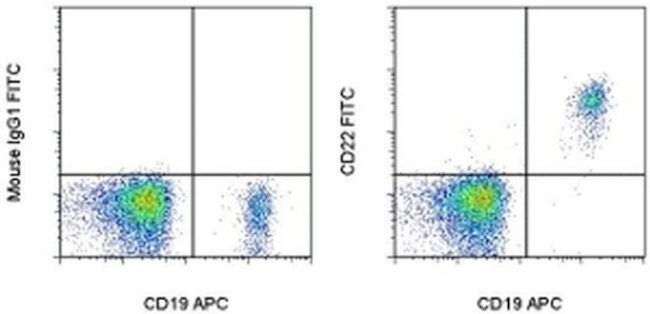Search Thermo Fisher Scientific
Invitrogen
CD22 Monoclonal Antibody (eBio4KB128 (4KB128)), FITC, eBioscience™
Product Details
11-0229-42
Species Reactivity
Host/Isotype
Recommended Isotype Control
Class
Type
Clone
Conjugate
Excitation/Emission Max
Form
Concentration
Purification
Storage buffer
Contains
Storage conditions
Shipping conditions
RRID
Product Specific Information
Description: The eBio4KB128 monoclonal antibody recognizes human CD22 (Siglec-2), which is a member of the siglec subgroup of the Ig superfamily. CD22 is a type I transmembrane glycoprotein composed of two polypeptide chains, CD22alpha and CD22beta, of 130 and 140 kDa respectively, produced by alternative splicing of the CD22 gene. CD22 is expressed at high levels on mature B cells and B cell lymphomas. The extracellular portion of CD22 contains seven Ig-like domains, some of which are capable of binding ligands with sialic acid moieties expressed on epithelial, endothelial, B and T cells. The intracellular portion of CD22 contains 6 tyrosine residues contained within immunotyrosine-based inhibitory motifs (ITIM) and immunotyrosine-based activation-like motifs, which are phosphorylated upon B-cell receptor engagement, which enables CD22 to participate in the positive and negative regulation of B-cell receptor signaling.
Applications Reported: This eBio4KB128 (4KB128) antibody has been reported for use in flow cytometric analysis.
Applications Tested: This eBio4KB128 (4KB128) antibody has been pre-titrated and tested by flow cytometric analysis of normal human peripheral blood cells. This can be used at 5 µL (0.25 µg) per test. A test is defined as the amount (µg) of antibody that will stain a cell sample in a final volume of 100 µL. Cell number should be determined empirically but can range from 10^5 to 10^8 cells/test.
Excitation: 488 nm; Emission: 520 nm; Laser: Blue Laser.
Filtration: 0.2 µm post-manufacturing filtered.
Target Information
CD22 (BL-CAM) is a type 1 integral membrane glycoprotein with molecular weight of 130 to 140 kDa. CD22 is expressed in both the cytoplasm and cell membrane of B-lymphocytes. CD22 antigen appears early in B-cell lymphocyte differentiation at approximately the same stage as the CD19 antigen. Unlike other B-cell markers, CD22 membrane expression is limited to the late differentiation stages comprised between mature B cells (CD22+) and plasma cells (CD22-), and may thus prove useful in phenotyping mature leukemias. CD22 is also strongly expressed in hairy cell leukemia. CD22 preferentially binds to alpha2,6-linked sialic acid. The sialic acid recognition site can be masked by cis interactions with sialic acids on the same cell surface. Upon ligand induced tyrosine phosphorylation in the immune response seems to be involved in regulation of B cell antigen receptor signaling. CD22 plays a role in positive regulation through interaction with Src family tyrosine kinases and may also act as an inhibitory receptor by recruiting cytoplasmic phosphatases via their SH2 domains that block signal transduction through dephosphorylation of signaling molecules. CD22 is also strongly expressed in hairy cell leukemia. CD22 is also positive in diffuse large B-cell lymphoma and nodular lymphocyte predominance Hodgkin’s lymphoma, but negative in classical Hodgkin’s lymphoma.
For Research Use Only. Not for use in diagnostic procedures. Not for resale without express authorization.
How to use the Panel Builder
Watch the video to learn how to use the Invitrogen Flow Cytometry Panel Builder to build your next flow cytometry panel in 5 easy steps.
References (0)
Bioinformatics
Protein Aliases: B-cell receptor CD22; B-lymphocyte cell adhesion molecule; B-lymphocyte cell adhesion molecule (BL-CAM); BL-CAM; CD22; CD22 antigen; FLJ22814; Lectin 2; Leu-14; MGC130020; sialic acid binding Ig-like lectin 2; Sialic acid-binding Ig-like lectin 2; Sialic acid-binding Ig-like lectin 2 (Siglec-2); Siglec-2; T-cell surface antigen Leu-14
Gene Aliases: CD22; SIGLEC-2; SIGLEC2
UniProt ID: (Human) P20273
Entrez Gene ID: (Human) 933

Performance Guarantee
If an Invitrogen™ antibody doesn't perform as described on our website or datasheet,we'll replace the product at no cost to you, or provide you with a credit for a future purchase.*
Learn more
We're here to help
Get expert recommendations for common problems or connect directly with an on staff expert for technical assistance related to applications, equipment and general product use.
Contact tech support


